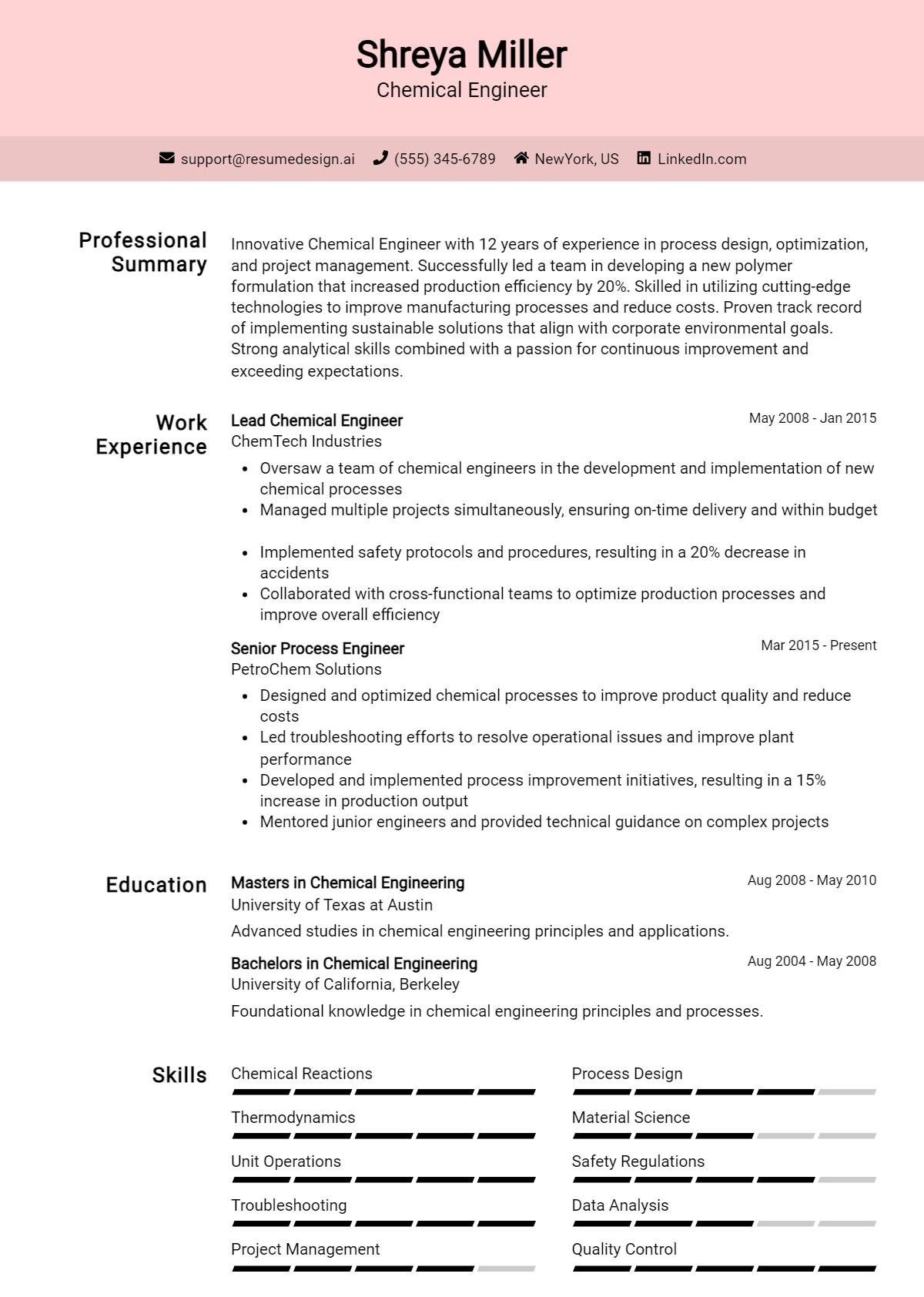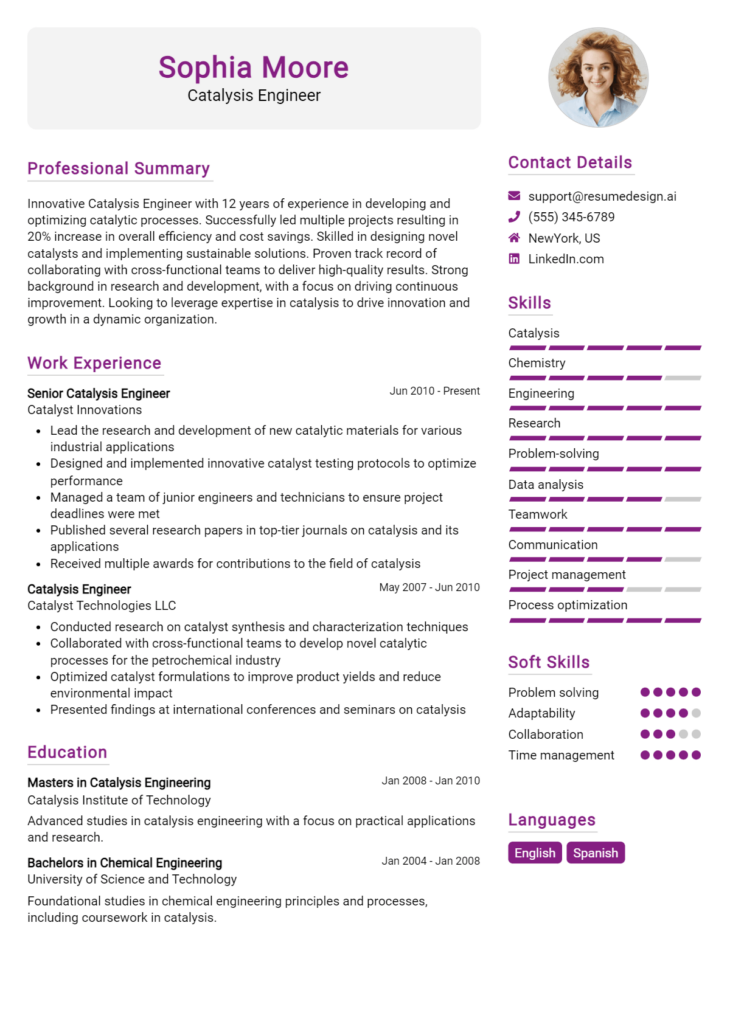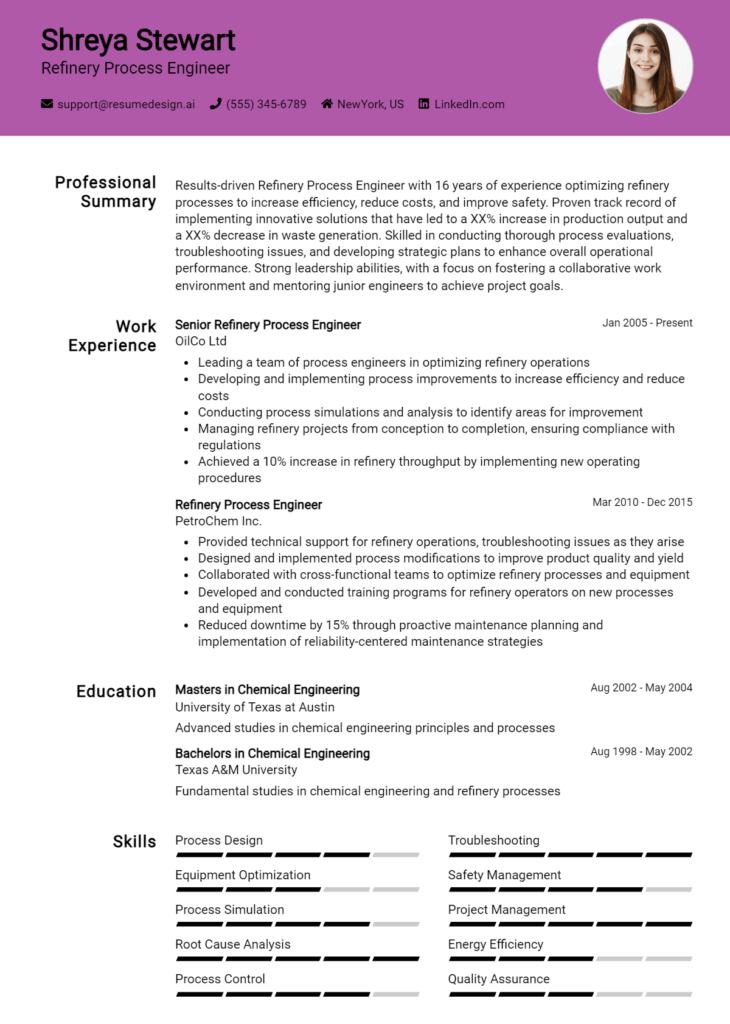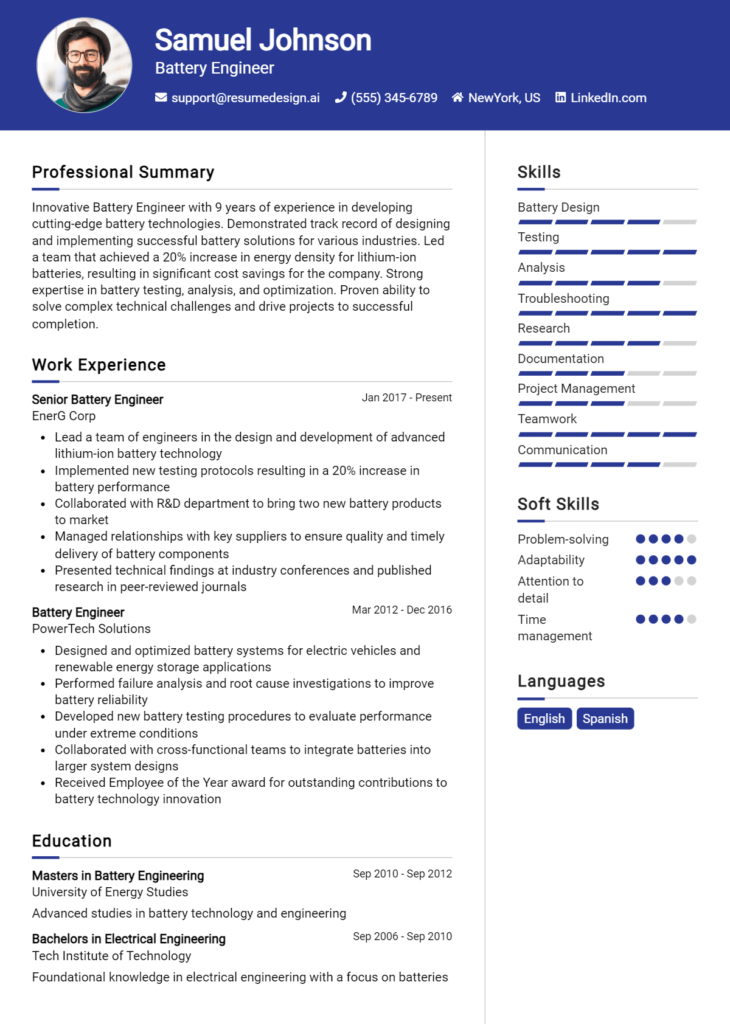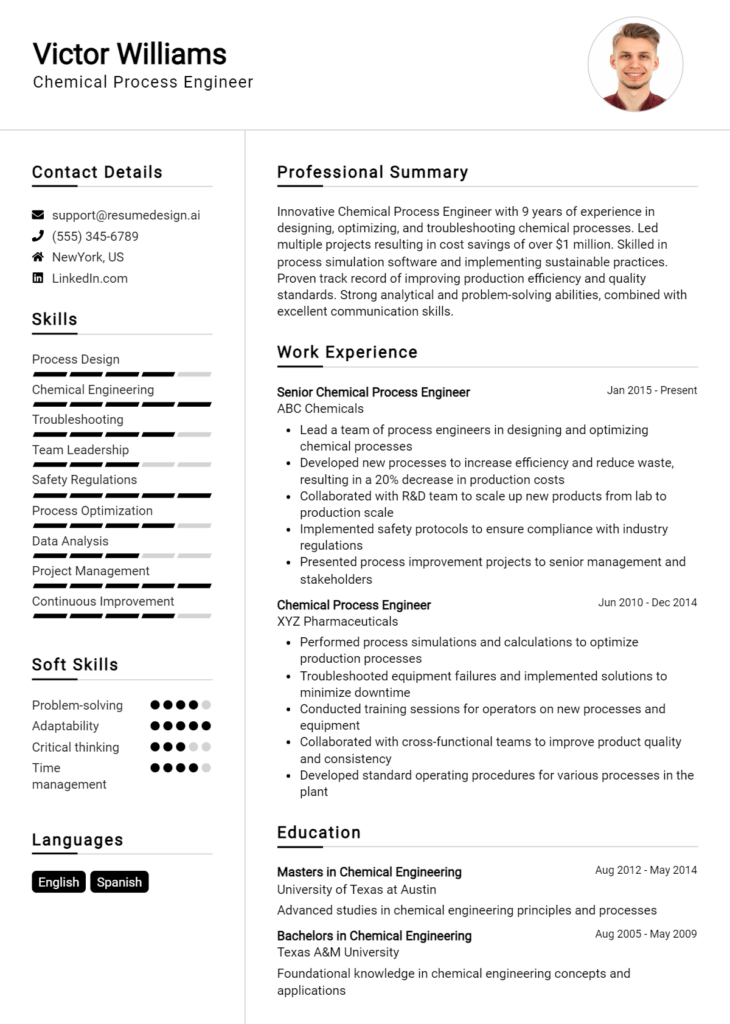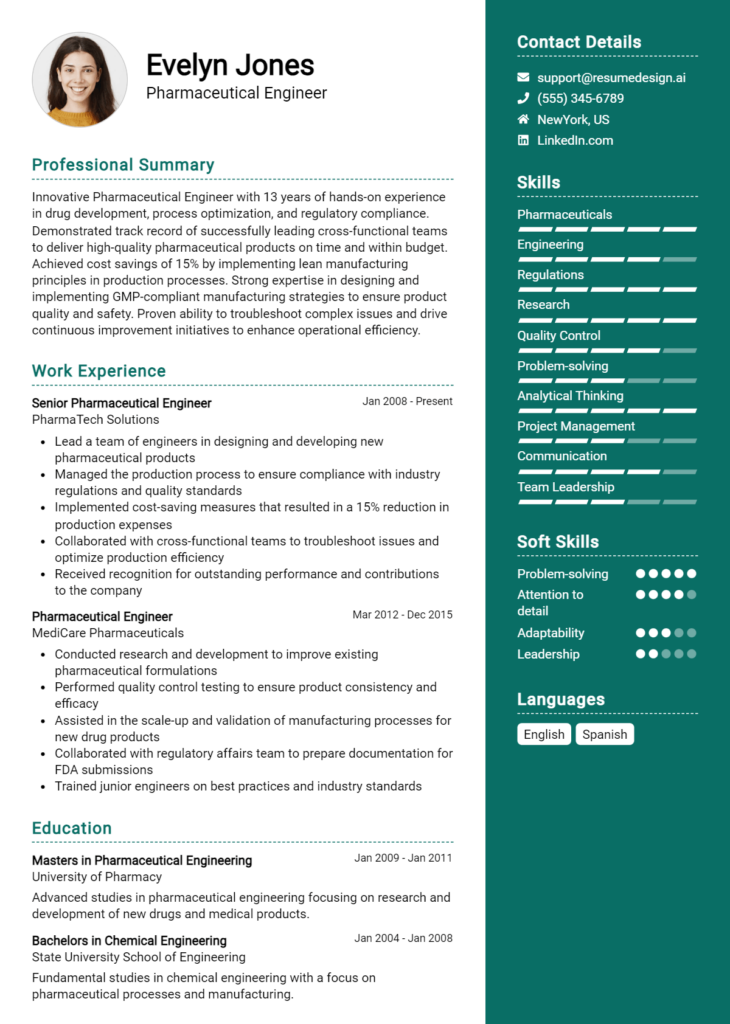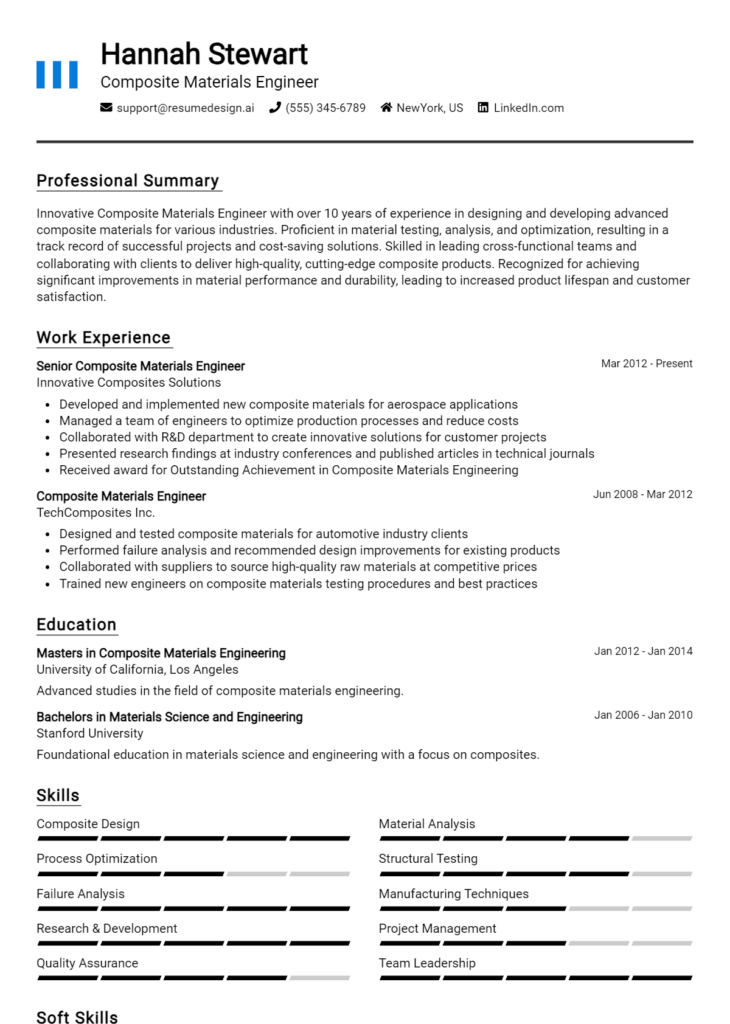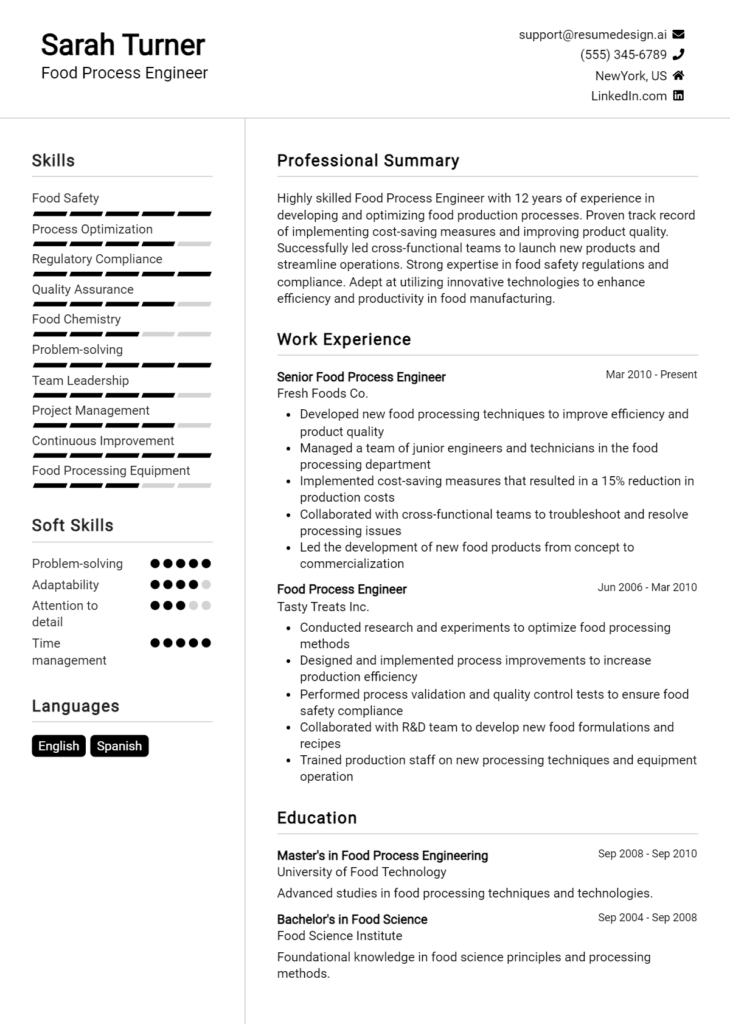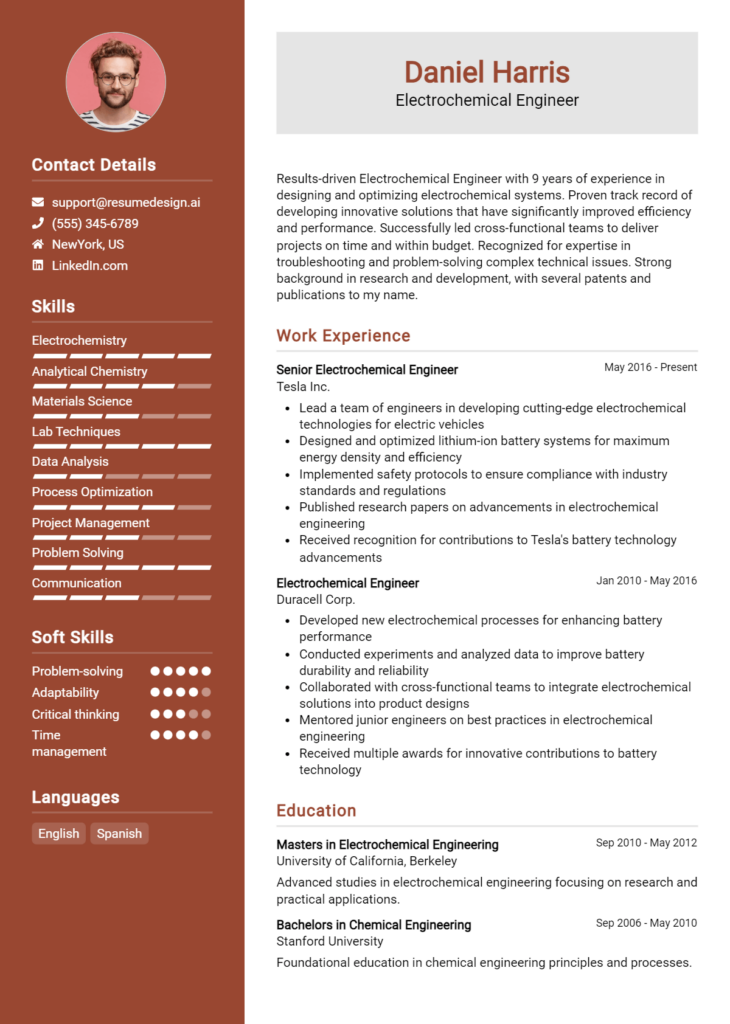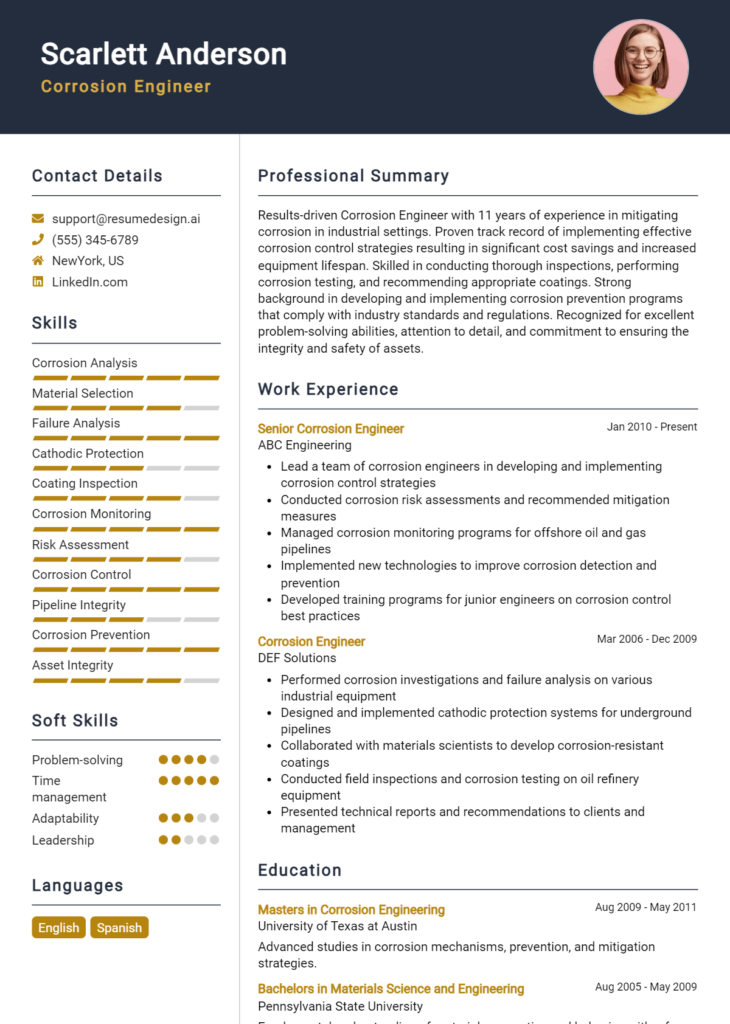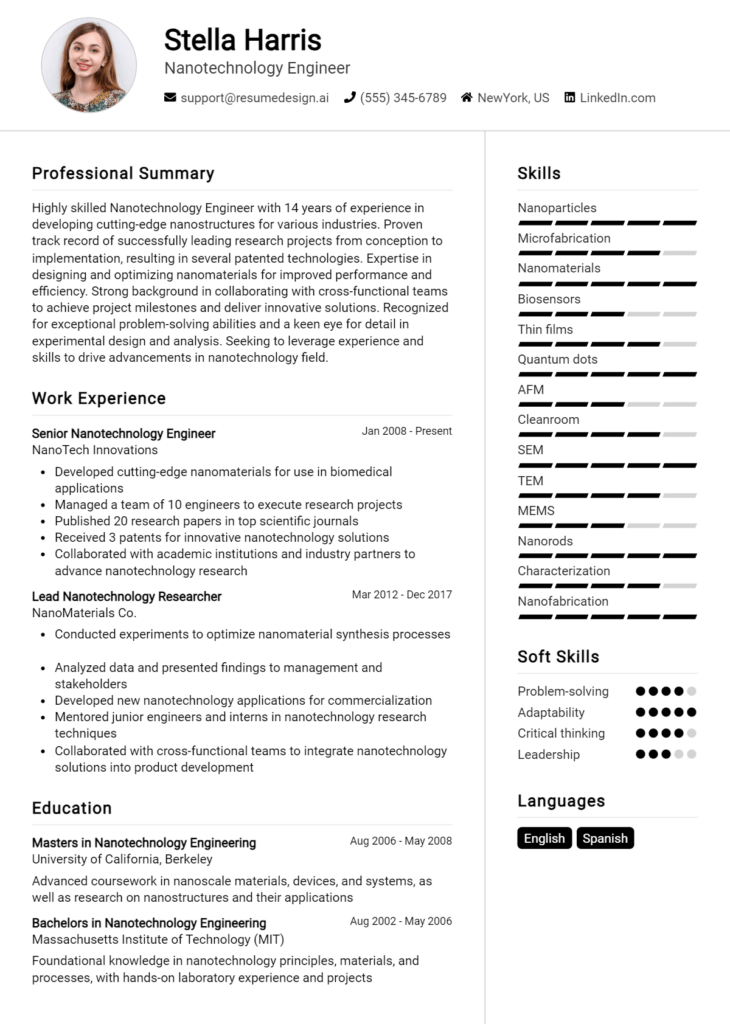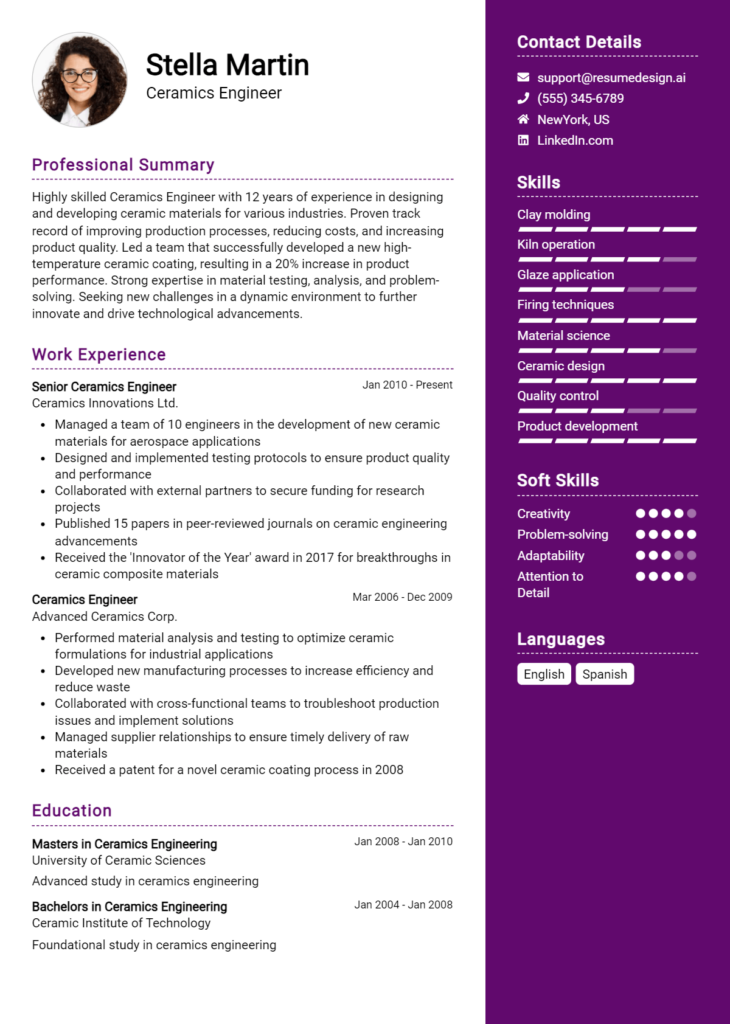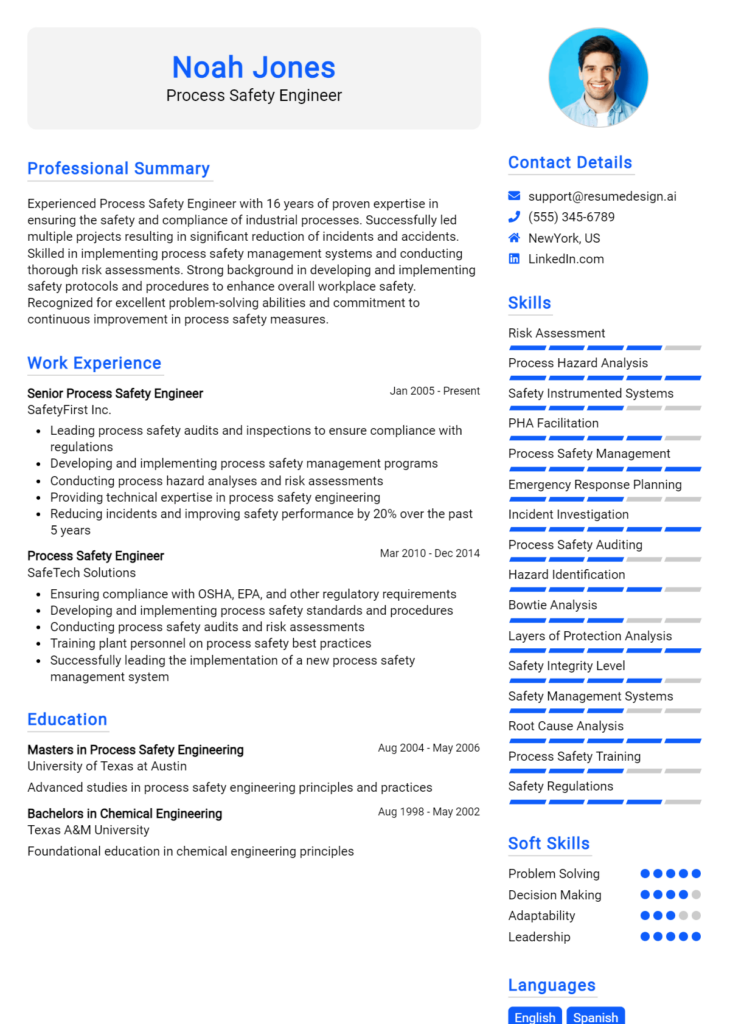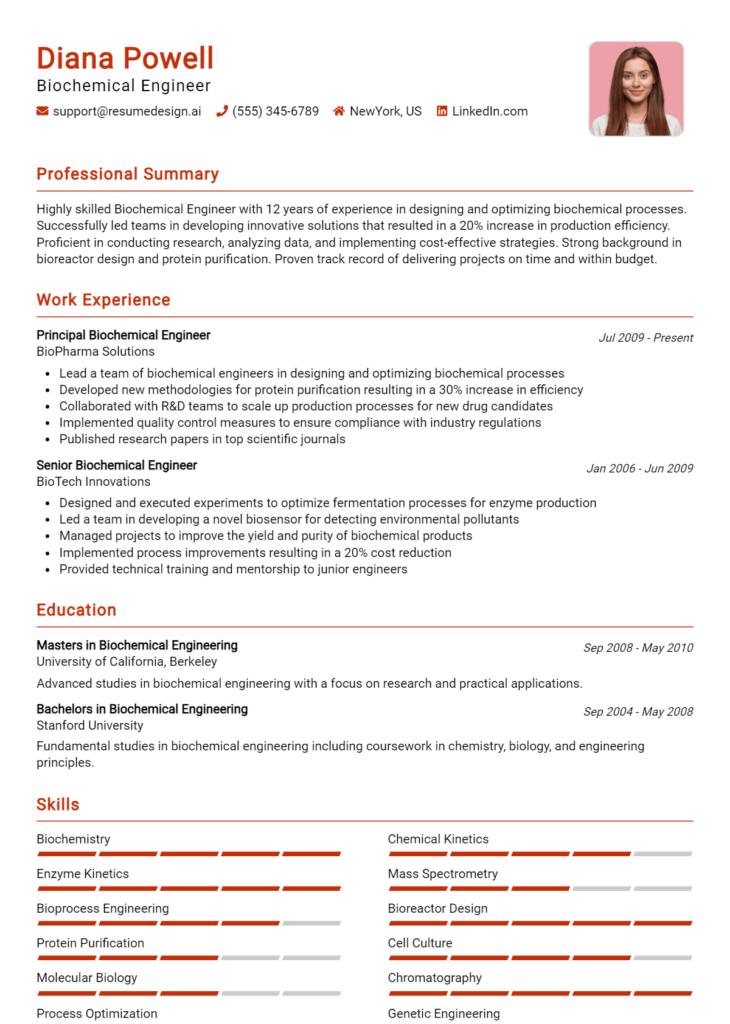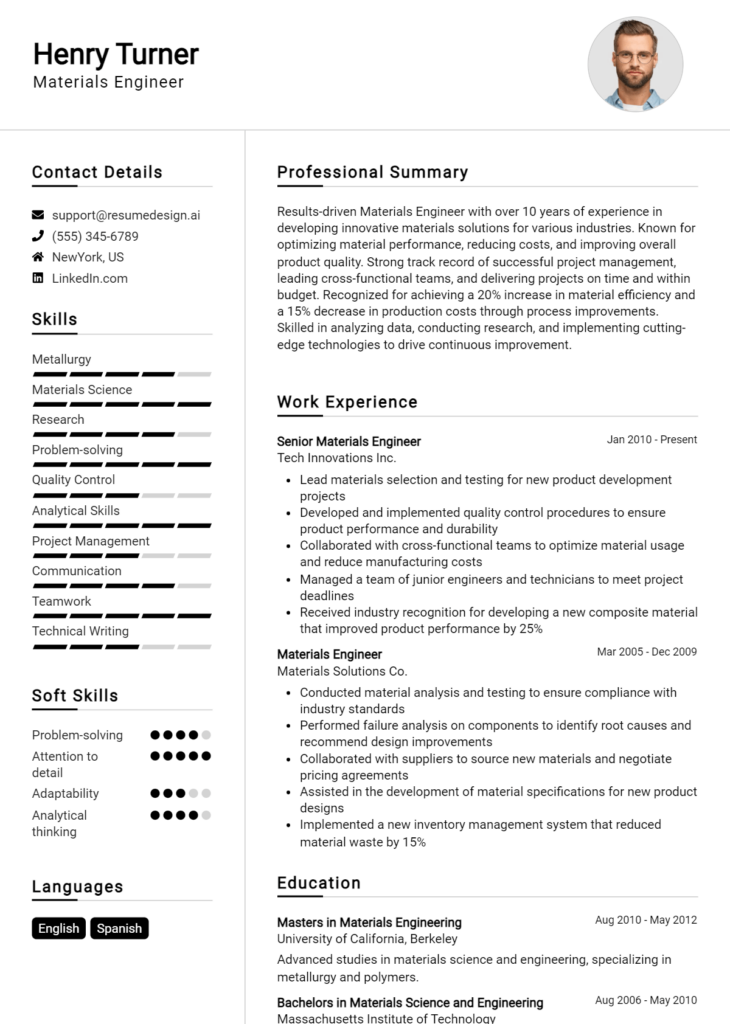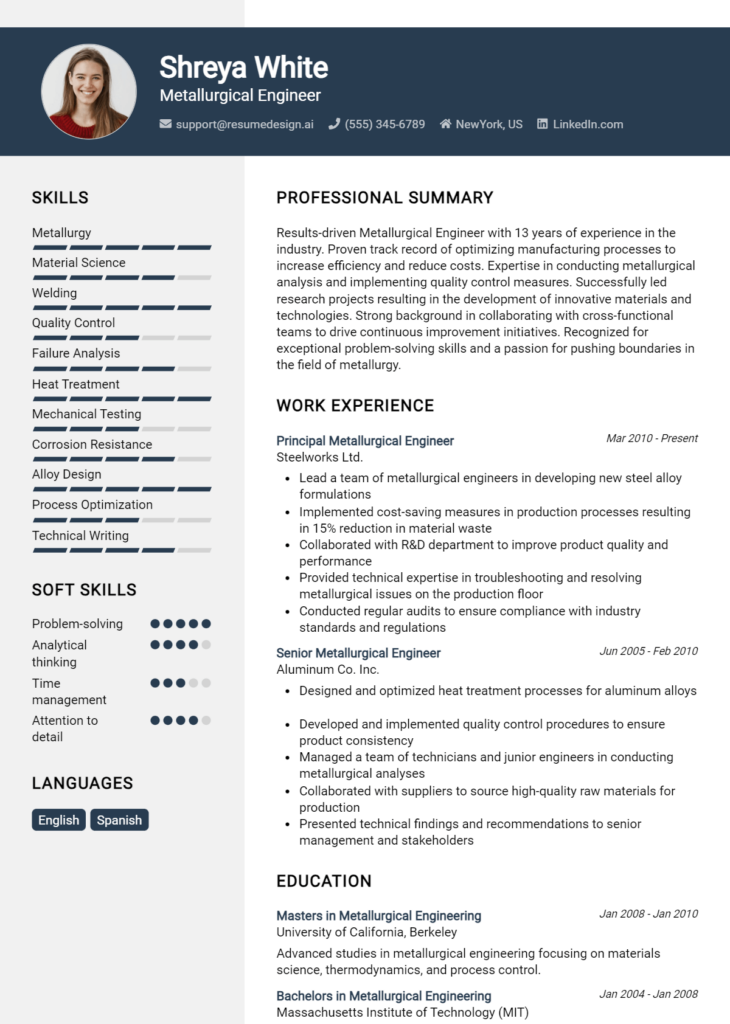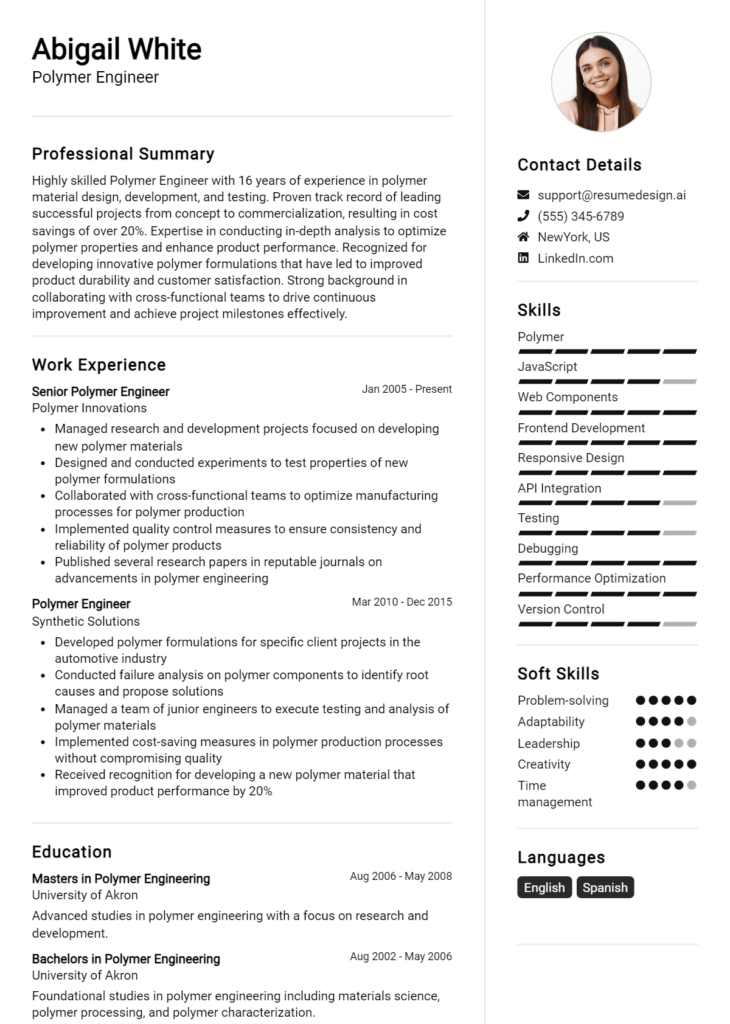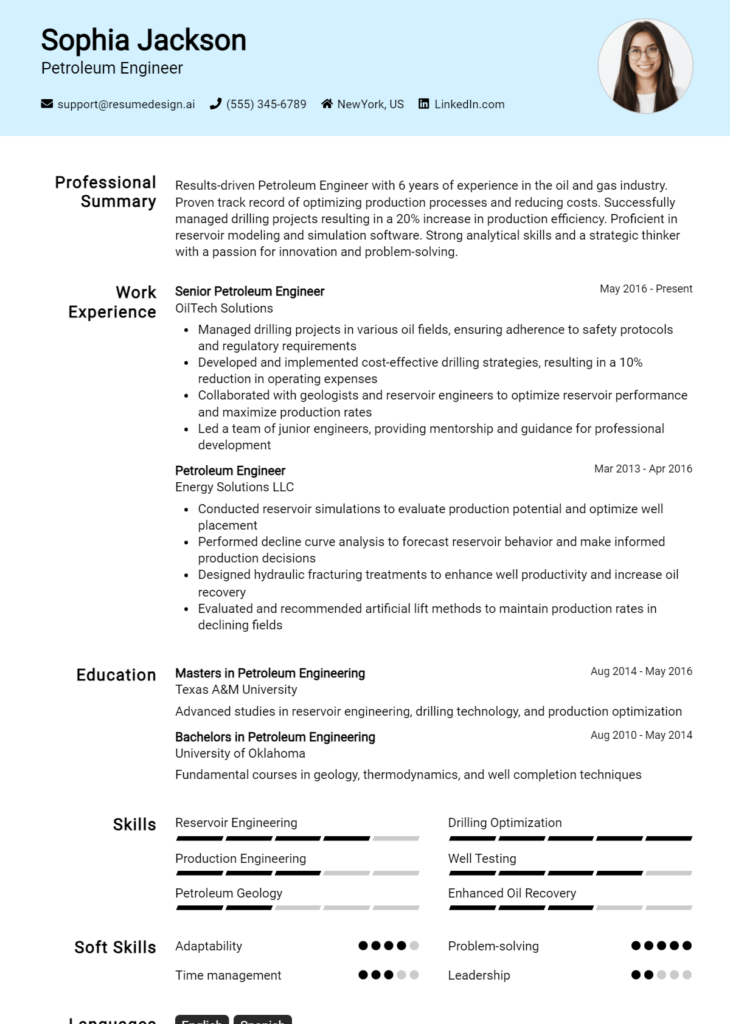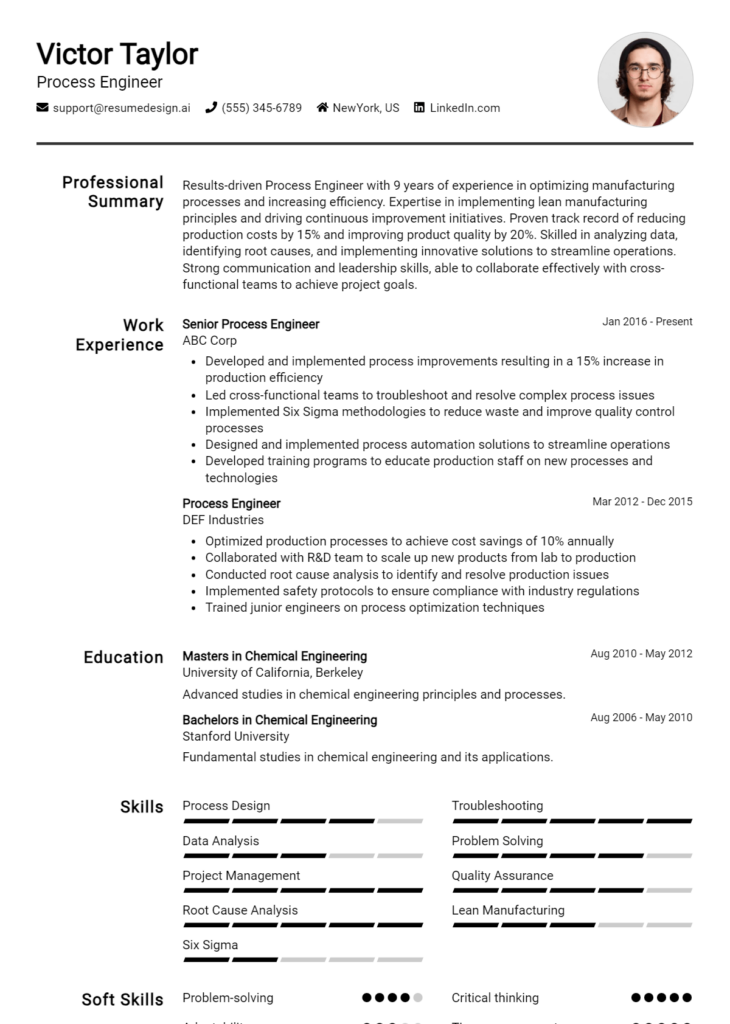Chemical Engineer Core Responsibilities
A Chemical Engineer plays a crucial role in developing processes and products that transform raw materials into valuable substances. This professional must possess strong technical knowledge, operational acumen, and exceptional problem-solving skills to effectively collaborate across departments such as production, safety, and quality assurance. These abilities are vital in meeting organizational goals, ensuring efficiency, and maintaining safety standards. A well-crafted resume that highlights these competencies can significantly enhance a Chemical Engineer's prospects in a competitive job market.
Common Responsibilities Listed on Chemical Engineer Resume
- Designing and developing chemical processes for production.
- Conducting experiments and analyzing data to improve processes.
- Ensuring compliance with environmental and safety regulations.
- Collaborating with multidisciplinary teams to optimize operations.
- Scaling up laboratory processes to pilot and production levels.
- Monitoring and troubleshooting production processes.
- Preparing technical reports and documentation.
- Implementing process improvements to enhance efficiency.
- Conducting risk assessments and safety audits.
- Managing project timelines and budgets.
- Researching new materials and technologies for product development.
High-Level Resume Tips for Chemical Engineer Professionals
In the competitive field of chemical engineering, a well-crafted resume serves as a vital tool for professionals aiming to make a strong first impression on potential employers. This document not only encapsulates a candidate's educational background and work experience but also highlights their unique skills and achievements that set them apart from the competition. A polished resume effectively communicates one's qualifications and alignment with the job requirements, making it essential for securing interviews. In this guide, we will provide practical and actionable resume tips specifically tailored for chemical engineer professionals, ensuring that your resume stands out in the hiring process.
Top Resume Tips for Chemical Engineer Professionals
- Tailor your resume to the specific job description, incorporating keywords and phrases that match the employer's requirements.
- Showcase relevant experience by emphasizing projects, internships, or roles directly related to chemical engineering.
- Quantify your achievements; use numbers and metrics to illustrate the impact of your contributions (e.g., reduced costs by 20% or improved efficiency by 15%).
- Highlight industry-specific skills, such as proficiency in chemical process simulation software, safety protocols, or regulatory compliance.
- Include relevant certifications and licenses, such as Professional Engineer (PE) status or Six Sigma Green Belt, to enhance credibility.
- Utilize a clean and professional format that makes it easy for hiring managers to scan your resume quickly.
- Incorporate a summary statement at the top that encapsulates your career goals and key qualifications in a few sentences.
- List technical skills in a dedicated section to make them easily identifiable, focusing on tools and technologies used in the chemical engineering field.
- Keep your resume concise, ideally one page, while ensuring all critical information is included and clearly presented.
- Proofread your resume thoroughly to eliminate any typos or grammatical errors, as attention to detail is crucial in engineering roles.
By implementing these tips, chemical engineering professionals can significantly enhance their resumes, increasing their chances of landing a job in this dynamic field. A targeted and polished resume not only showcases your qualifications but also demonstrates your commitment to professionalism and attention to detail, traits that are highly valued by employers in the industry.
Why Resume Headlines & Titles are Important for Chemical Engineer
In the competitive field of chemical engineering, a well-crafted resume headline or title holds significant importance. It serves as the first impression a hiring manager has of a candidate, providing a snapshot of their professional identity and key qualifications. A strong headline can immediately capture attention, summarizing a candidate's essential skills and experiences in a concise and impactful manner. By ensuring that this title is relevant to the specific job being applied for, candidates can effectively position themselves as the ideal fit for the role, making it crucial to invest time in this aspect of resume writing.
Best Practices for Crafting Resume Headlines for Chemical Engineer
- Keep it concise: Aim for one impactful phrase that summarizes your expertise.
- Be role-specific: Tailor your headline to match the specific chemical engineering position.
- Highlight key qualifications: Focus on what sets you apart, such as your skills, experiences, or accomplishments.
- Use industry-specific terminology: Incorporate relevant jargon that resonates with hiring managers in chemical engineering.
- Showcase your value: Emphasize how your skills can benefit the employer or project.
- Stay professional: Maintain a formal tone and avoid overly casual language.
- Avoid vague statements: Be clear and specific to avoid blending in with other applicants.
- Consider including certifications or specializations: Mention any relevant credentials that add to your qualifications.
Example Resume Headlines for Chemical Engineer
Strong Resume Headlines
Innovative Chemical Engineer Specializing in Sustainable Process Development
Experienced Chemical Engineer with Proven Track Record in Project Management and Optimization
Dedicated Chemical Engineer with Expertise in Polymer Chemistry and Material Science
Weak Resume Headlines
Chemical Engineer Looking for Opportunities
Engineer with Experience
The strong headlines are effective because they clearly communicate the candidate’s specialized skills and relevant experiences, making them stand out in a sea of applicants. They are specific, focused, and directly related to the position, showcasing the candidate's value to potential employers. In contrast, the weak headlines fail to impress due to their vagueness and lack of detail, offering little insight into the candidate's qualifications or unique attributes, which can lead to being overlooked in the hiring process.
Writing an Exceptional Chemical Engineer Resume Summary
A well-crafted resume summary is crucial for a Chemical Engineer seeking to make a strong impression on hiring managers. This brief introduction serves as a snapshot of the candidate's qualifications, skills, and accomplishments, allowing potential employers to quickly gauge their fit for the role. A compelling summary not only highlights the most relevant experiences and technical skills but also showcases the candidate's ability to contribute to the organization's success. When tailored specifically to the job at hand, a resume summary can effectively capture attention and set the candidate apart from the competition, making it an essential component of any successful application.
Best Practices for Writing a Chemical Engineer Resume Summary
- Quantify achievements: Use numbers and data to showcase the impact of your work.
- Focus on relevant skills: Highlight technical and soft skills that are directly applicable to the job.
- Tailor the summary: Customize your summary for each job application to align with the job description.
- Use strong action verbs: Start sentences with dynamic verbs to convey confidence and proactivity.
- Keep it concise: Aim for 3-5 sentences that deliver maximum impact without being overly verbose.
- Showcase industry knowledge: Include specific industry terms or technologies to demonstrate expertise.
- Highlight certifications: Mention any relevant certifications or licenses that enhance your qualifications.
- Emphasize problem-solving skills: Illustrate your ability to address challenges and improve processes.
Example Chemical Engineer Resume Summaries
Strong Resume Summaries
Results-driven Chemical Engineer with over 5 years of experience in process optimization and safety management. Successfully led a team to reduce production costs by 15% while increasing output efficiency by 20% through innovative process redesigns.
Detail-oriented Chemical Engineer possessing a Master’s degree and expertise in polymer synthesis and material characterization. Developed a new polymer blend that improved product durability by 30%, leading to a 25% increase in customer satisfaction ratings.
Dynamic Chemical Engineer with a proven track record in scaling up chemical processes for commercial production. Achieved a 40% reduction in waste generation through the implementation of sustainable manufacturing practices, contributing to a greener production line.
Innovative Chemical Engineer with 7 years of experience in the pharmaceutical industry, specializing in the development of drug formulations. Spearheaded a project that successfully accelerated product launch timelines by 3 months, resulting in significant market advantages.
Weak Resume Summaries
Chemical Engineer with experience in various projects. Looking to improve skills and find a good job.
Dedicated professional with a background in chemical engineering. I have worked on different tasks and am eager to contribute to a new team.
The examples provided showcase the distinctions between strong and weak resume summaries. Strong summaries effectively quantify achievements and highlight specific skills and experiences directly relevant to the Chemical Engineer role, creating a compelling narrative for hiring managers. In contrast, weak summaries lack detail, are overly generic, and do not demonstrate the candidate's value or unique qualifications, making them less likely to capture attention.
Work Experience Section for Chemical Engineer Resume
The work experience section of a Chemical Engineer's resume is crucial as it serves as a testament to the candidate's technical skills, leadership capabilities, and ability to deliver high-quality products in a complex industry. This section not only highlights practical experience in chemical processes and engineering principles but also reflects the candidate's proficiency in managing teams and projects. By quantifying achievements, such as cost savings or efficiency improvements, and aligning experiences with industry standards, candidates can effectively demonstrate their value to potential employers and differentiate themselves in a competitive job market.
Best Practices for Chemical Engineer Work Experience
- Highlight specific technical skills related to chemical engineering, such as process design, safety management, and quality control.
- Quantify achievements with metrics like percentage improvements, cost reductions, or production increases to showcase results.
- Include collaborative projects that emphasize teamwork and leadership abilities, demonstrating the ability to work with cross-functional teams.
- Tailor experiences to match job descriptions, ensuring relevance to the position being applied for.
- Use action verbs to convey a sense of proactivity and impact in your achievements.
- Focus on results-oriented statements that illustrate how your work contributed to the company's goals.
- Incorporate industry-standard terminologies to resonate with hiring managers and applicant tracking systems.
- Include professional development or certifications that enhance your qualifications as a chemical engineer.
Example Work Experiences for Chemical Engineer
Strong Experiences
- Led a team of 5 engineers in a project that optimized the chemical production process, resulting in a 20% reduction in production costs and a 15% increase in output.
- Developed and implemented a new waste management protocol that decreased waste disposal costs by 30% and improved compliance with environmental regulations.
- Managed cross-departmental collaboration on a new product launch that achieved a market share increase of 10% within the first year, exceeding corporate targets.
- Conducted a comprehensive safety audit that led to the identification and resolution of 25 potential hazards, significantly reducing workplace incidents over a two-year period.
Weak Experiences
- Worked on various projects that involved chemical processes.
- Assisted in the production of chemicals and ensured quality control.
- Participated in team meetings and contributed ideas.
- Helped with safety inspections and compliance checks.
The strong experiences are considered effective because they provide specific metrics and demonstrate leadership, quantifiable outcomes, and collaboration, which are essential in the role of a chemical engineer. In contrast, the weak experiences lack detail and do not convey the candidate's impact or accomplishments effectively. They are vague and fail to showcase the candidate's technical expertise or contributions, making them less compelling to potential employers.
Education and Certifications Section for Chemical Engineer Resume
The education and certifications section of a Chemical Engineer resume is crucial as it underscores the candidate's academic qualifications and commitment to professional development. This section not only showcases the educational background that has equipped the candidate with the necessary theoretical knowledge and practical skills but also highlights industry-relevant certifications that demonstrate expertise and credibility. By including relevant coursework, specialized training, and certifications from recognized institutions, candidates can significantly enhance their appeal to potential employers, illustrating a proactive approach to continuous learning and alignment with the demands of the chemical engineering field.
Best Practices for Chemical Engineer Education and Certifications
- Prioritize relevant degrees such as a Bachelor's or Master's in Chemical Engineering or related fields.
- Include certifications from recognized organizations, such as the Engineer-in-Training (EIT) or Professional Engineer (PE) licensure.
- List relevant coursework that highlights specialized knowledge in areas like thermodynamics, reaction engineering, or process design.
- Highlight any specialized training or workshops that are pertinent to the role, such as safety protocols or software tools.
- Keep the section organized and concise, focusing on the most pertinent qualifications.
- Update the section regularly to reflect any new certifications or educational accomplishments.
- Use clear formatting to ensure easy readability and quick access to key information.
- Tailor the content to match the job description, emphasizing qualifications that align with the employer's needs.
Example Education and Certifications for Chemical Engineer
Strong Examples
- Bachelor of Science in Chemical Engineering, Massachusetts Institute of Technology, 2022
- Certified Six Sigma Green Belt, American Society for Quality, 2023
- Relevant Coursework: Advanced Process Control, Chemical Reaction Engineering, and Industrial Safety Management
Weak Examples
- Bachelor of Arts in Philosophy, University of California, 2018
- Certification in Basic First Aid, Red Cross, 2020
- Relevant Coursework: Introduction to Psychology and History of Art
The examples listed above are considered strong because they directly align with the qualifications needed for a Chemical Engineer position, demonstrating relevant education and certifications that enhance the candidate's credibility. In contrast, the weak examples highlight degrees and certifications that are unrelated to the field of chemical engineering, showcasing a lack of focus on the necessary qualifications for the role. This distinction underscores the importance of selecting and presenting educational achievements that resonate with potential employers in the industry.
Top Skills & Keywords for Chemical Engineer Resume
The importance of skills in a Chemical Engineer resume cannot be overstated. As the field of chemical engineering continues to evolve, employers are increasingly looking for candidates who not only possess the technical knowledge but also the soft skills necessary to thrive in collaborative environments. A well-crafted resume that highlights both hard and soft skills can greatly enhance a candidate's chances of landing an interview. It serves as a reflection of their capabilities and readiness to tackle the complexities of chemical engineering projects, from process design to safety management. In this competitive job market, showcasing a balanced combination of skills is essential for standing out.
Top Hard & Soft Skills for Chemical Engineer
Soft Skills
- Problem-solving
- Team collaboration
- Communication
- Critical thinking
- Time management
- Adaptability
- Project management
- Attention to detail
- Creativity
- Leadership
Hard Skills
- Process simulation software (e.g., Aspen Plus, HYSYS)
- Chemical process design
- Thermodynamics
- Fluid mechanics
- Material science
- Safety and hazard analysis
- Quality control techniques
- Data analysis and interpretation
- Environmental regulations compliance
- Research and development methodologies
By effectively incorporating these skills into a resume and demonstrating relevant work experience, aspiring chemical engineers can better position themselves for success in this dynamic field.
Stand Out with a Winning Chemical Engineer Cover Letter
I am writing to express my interest in the Chemical Engineer position at [Company Name], as advertised on [where you found the job listing]. With a Bachelor’s degree in Chemical Engineering from [Your University] and over [X years] of hands-on experience in process design, optimization, and safety management, I am excited about the opportunity to contribute to your team. My technical expertise, combined with a strong commitment to sustainable practices, aligns well with [Company Name]'s mission to innovate and improve chemical processes responsibly.
In my previous role at [Previous Company Name], I successfully led a team in the development of a new chemical process that increased production efficiency by [X%] while reducing waste generation. My proficiency in using advanced simulation software, such as Aspen Plus and MATLAB, allowed me to model complex systems and identify key areas for improvement. Additionally, I have a solid understanding of regulatory compliance, ensuring that all processes met industry standards and environmental regulations. I am particularly drawn to [Company Name] because of your commitment to sustainability and the development of eco-friendly products, an area I am passionate about.
Collaboration is integral to successful engineering projects, and I pride myself on my ability to work effectively in multidisciplinary teams. During my tenure at [Previous Company Name], I collaborated with chemists, mechanical engineers, and production teams to optimize plant operations, resulting in a significant reduction in operational costs and improved safety metrics. I believe my interpersonal skills and ability to communicate complex technical concepts clearly will enable me to contribute positively to the collaborative environment at [Company Name].
I am eager to bring my background in chemical engineering and my dedication to innovative solutions to the esteemed team at [Company Name]. I am looking forward to the possibility of discussing how my experience and vision can contribute to the continued success and growth of your organization. Thank you for considering my application; I hope to speak with you soon to explore this opportunity further.
Common Mistakes to Avoid in a Chemical Engineer Resume
When crafting a resume as a Chemical Engineer, it’s essential to present your skills and experiences effectively to stand out in a competitive job market. However, many candidates make common errors that can hinder their chances of landing an interview. Avoiding these pitfalls can significantly enhance the clarity and impact of your resume, showcasing your qualifications and readiness for the role. Here are several common mistakes to steer clear of:
Generic Objective Statement: Using a vague or generic objective that doesn’t specifically relate to the chemical engineering field can make your resume forgettable. Tailor your objective to reflect your goals and how they align with the potential employer's needs.
Neglecting Technical Skills: Failing to highlight relevant technical skills such as process design, simulation software, or laboratory techniques can lead to missed opportunities. Make sure to list specific software and methodologies you are proficient in.
Overloading with Jargon: While technical terminology is important, overloading your resume with jargon can confuse or alienate hiring managers. Strike a balance by using clear language that conveys your expertise without overwhelming the reader.
Ignoring Quantifiable Achievements: Not including quantifiable results from your previous roles can make your contributions seem less impactful. Use metrics to demonstrate your achievements, such as increased efficiency percentages or cost savings.
Listing Responsibilities Instead of Accomplishments: Merely listing job responsibilities instead of focusing on your accomplishments can fail to capture your unique contributions. Highlight your achievements and the positive outcomes of your actions.
Inconsistent Formatting: A resume with inconsistent formatting can be distracting and unprofessional. Ensure uniform font sizes, bullet points, and spacing throughout to create a polished appearance.
Failing to Tailor for Each Application: Sending out the same resume for multiple applications without tailoring it to specific job descriptions can diminish your chances. Customize your resume to reflect the required skills and experiences outlined in each job posting.
Including Irrelevant Information: Adding unrelated work experience or personal details can clutter your resume and detract from your qualifications. Focus solely on experiences and skills that are pertinent to the chemical engineering position you are pursuing.
By avoiding these common mistakes, you can create a compelling and professional resume that effectively showcases your talents and experiences as a Chemical Engineer.
Conclusion
As we wrap up our exploration of the vital role of a Chemical Engineer, it's essential to remember the skills and qualifications that make you an attractive candidate in this competitive field. From a solid foundation in chemistry and mathematics to expertise in process design and safety protocols, each element of your expertise contributes to your professional profile.
In today's job market, having an impressive resume is crucial for standing out. A well-structured resume not only highlights your technical skills but also showcases your problem-solving abilities and project management experience. Don’t forget to tailor your resume to each job application, emphasizing the most relevant experiences and accomplishments.
To ensure your resume makes a strong impact, consider utilizing available tools that can streamline the process. Check out resume templates to get started on a professional design. The resume builder can help you create a polished resume quickly and efficiently, while resume examples provide inspiration and guidance on how to effectively present your background. Additionally, complement your resume with a compelling cover letter template that articulates your passion for the field and your unique qualifications.
Now is the time to review and enhance your Chemical Engineer resume. Take action today to ensure you are putting your best foot forward in your job search!

